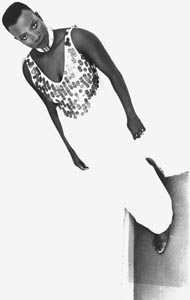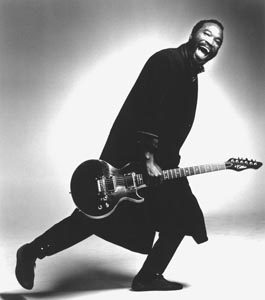![[Metroactive Music]](/music/gifs/music468.gif)
[ Music Index | San Jose | Metroactive Central | Archives ]
 The Power of Improvisation: Angelique Kidjo of Benin believes that jazz must blend and change in order to survive.
The Power of Improvisation: Angelique Kidjo of Benin believes that jazz must blend and change in order to survive.
The World Comes to Jazz AT&T San Jose Jazz Festival performers talk about the spiritual connections in their music By Marianne Messina LOCAL SINGER, songwriter and guitarist Samba Ngo speaks fondly of his native Congo and how the myriad rhythms of Latin jazz originated there and how in every village there is "always an orchestra, five or six people playing" traditional instruments, ready at a moment's notice to accompany a celebration, a ceremony, a healing. Ngo's mother still lives in Brazzaville, Congo, and thanks to his successful music career, he's "bought her a little house." Yet throughout his adult life, Ngo, who is now 50, has been back to his homeland only twice. "I'm not back in Africa because I can't go back," he says simply. He adds, in French, that his songs are engagé, or politically charged. And he knows of fellow countrymen who have been killed for similar songs. Musically, Ngo's songs are joyous, danceable and upbeat. In the popular Congolese soukous style, he keeps his rich-toned voice playful; he plays guitar in sketchy syncopated layers; he uses call/response and the rumba feel. But many a reviewer has noted the incongruous lyrics, sometimes critical, sometimes tragic, that darken his festival-type sound: "Democracy will not come, suffocated by diamonds ... manganese ... petroleum ... /It's panic in the village." This bleak picture is not appreciated at home. Ça ne fait rien. Brazzaville's loss is the greater jazz world's gain. "Jazz musicians are looking for the influence of other cultures to create new music," says drummer Sylvia Cuenca. In the year since the San Jose native was last in town for the AT&T San Jose Jazz Festival, she has toured Europe, Latin America and Asia. And from each place she visits, she tries to bring back CDs that capture the traditional music of the region. "I feel that world music is going to have a major influence on the direction of what we call jazz," adds trombonist Steve Turre, "because in reality, jazz is one of the original world musics."
AT&T San Jose Jazz Festival Schedule: Complete event listings. Pick 'Em: Jesse Chuy Varela runs down some of the high points of this year's Jazz Festival.
FUELING the musical exchange seems to be a sense that jazz, a once free and expressive amalgam of cultural identities, is somehow becoming constricted by its own past, the icons, the canon and ultimately clichés. The way Turre sees it, it is only commercial jazz--"what's getting publicity"--that is strangling in its old skin. The heart of jazz, he maintains, "is continuing to move as it always has and it always will, because it's a creative music." Turre started collecting world sounds when he was touring with Woody Shaw and with the Dizzy Gillespie United Nations Big Band. The list of influences he brought back is a lengthy one. "Gamelan music from Indonesia," he begins; "Tahitian music's got some serious rhythm; Japanese traditional music with the Koto and the shakahatchi flute. I have a record with a lady playing a Chinese instrument called the pipa. It almost sounds like she's playing the blues. I've been to Turkey, and they have wonderful music that's in odd meters there. They're serious about nine [music with nine beats to a measure] in Turkey. They stretch out on it. I went there and heard that shit, and I said, 'Damn!' " Western jazz artists find more than souvenir sounds and rhythms among traditional musics. They find a raw vitality rooted in the politics of struggle; they find a value system that often equates music with spirituality or healing.
FOR SAMBA NGO, the healing nature of music is something he takes for granted; his father used music to heal, meditating on a patient's complaint until the "appropriate" song came to him and then playing the song with the help of the village musicians. As a result, Ngo believes that music's function goes far beyond entertainment. "Music heals my mind, my spirit," he says. Turre put forth the same ideals in his 1995 CD Sanctified Shells. An ancient instrument indigenous to both Africa and Mexico, the large conch shell, Turre points out, is "an instrument that in its entirety was alive once. That's a deep thing." Angelique Kidjo, popular Beninese singer of Peter Gabriel and Lilith Fair fame, is also quite vocal about the spiritual component of music. She points out proudly that in Benin, the cradle of voodoo and animistic values, she grew up with spiritual empowerment. "When I call God‚ anywhere," Kidjo says, "he's right there where you call him." Her spirituality doesn't depend on a church. "Religion is a matter of control and power. They screwed up the countries big time in the name of God." Like Ngo, Kidjo has made sacrifices and survived dangerous politics. As Benin's fledgling Communist government became more and more insistent that she sing pro-government songs, Kidjo chose to leave her homeland and keep her music close to the heart. When she got to Paris and met the music industry, she realized that other powers--like money--could besiege musical expression. Samba Ngo seconds that view as he talks about a trend he finds appalling in his travels around the world. "'Money, money, money, money,' and no maman in the house." Ngo has held firm against bottom-line pressure tactics from record labels. "I have too much respect for music," he explains. "People say, 'You're not going to make any money.' I don't care." Meanwhile, Turre didn't have to be born in political upheaval to hold the same values. Though he plays with the Saturday Night Live band, he doesn't like to talk about it. "That has nothing to do with my jazz career," he says. For him, employment is not art. "[Writing music for money] turns the spirit somewhere else. And I find that offensive. I can listen to [a piece] and in a minute tell the motivation. When something is motivated by money, it has a different spirit than something that's motivated by the need to express." Kidjo feels her work is particularly vulnerable to financial motives when it comes to producers. Her tours and collaborations with the likes of Peter Gabriel, Dave Matthews, Branford Marsalis and Cassandra Wilson have given her high visibility. So producers of the hit-hunter variety will often come in with formulaic rigidity and minimize her artistic input. Kidjo screens out such producers ruthlessly. Her 1995 album, Fifa, was a formula producer's worst nightmare. Kidjo traveled through outlying "bush" areas of Benin recording the local musicians in their very much nonstudio environments--a rich array of birimbau players, wooden flute players, and singers. In villages that may not have seen a car in months, much less a generator, Kidjo had to hook her recording devices to a car battery. Everywhere she went, the people asked her, "Why are you taping it?" For them, music was an immediate and ever-present experience. For her efforts, Kidjo was accused by some critics of "diluting" the traditional music, in the same way Westerners like Gabriel, Paul Simon and Sting came under fire for "exploiting" traditional musics. But jazz, evolving child of cultural confluence, of "inclusion" as Turre puts it, of improvisation, is a music that reflects the flexibility of survival. African culture survived in the diaspora, Kidjo maintains, because it was open; it was able to blend. "You gotta improvise in African music," she explains, echoing the living motto of jazz: in improvisation there is strength.
Samba Ngo plays Saturday (Aug. 11) at 4:30pm on the World Music Stage, Park Avenue at Almaden Boulevard. The Sylvia Cuenca Group plays Sunday (Aug. 12) at 4pm on the Women in Jazz Stage, Club Ibex, 55 S. Market St. The Steve Turre Quintet plays Sunday (Aug. 12) at 4:30pm on the Main Stage, Plaza de Cesar Chavez. Angelique Kidjo plays Saturday (Aug. 11) at 6pm on the Main Stage. [ San Jose | Metroactive Central | Archives ]
|
From the August 9-15, 2001 issue of Metro, Silicon Valley's Weekly Newspaper.
Copyright © 2001 Metro Publishing Inc. Metroactive is affiliated with the Boulevards Network.
For more information about the San Jose/Silicon Valley area, visit sanjose.com.
![[line]](/gifs/line.gif)
